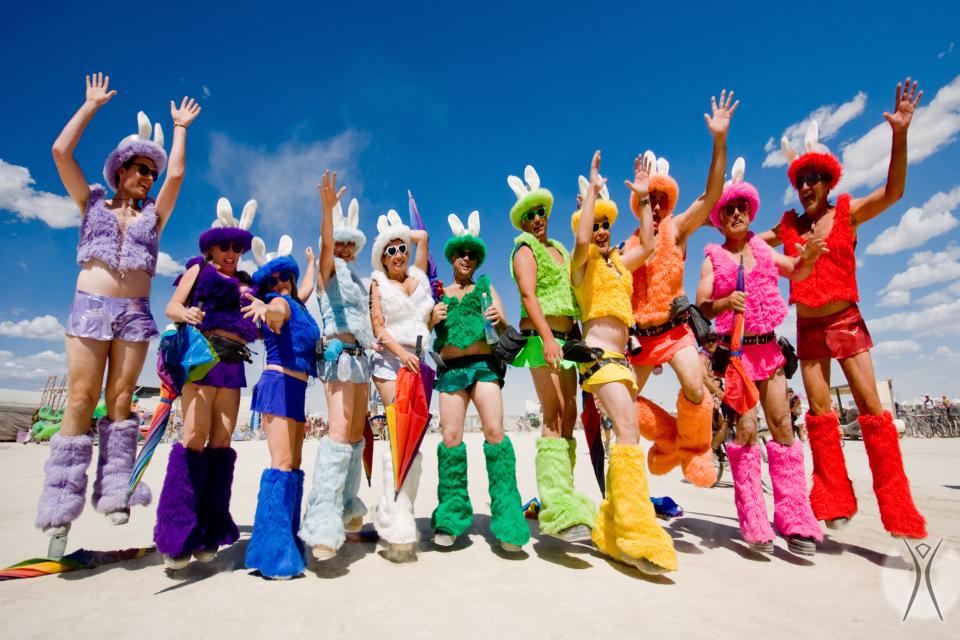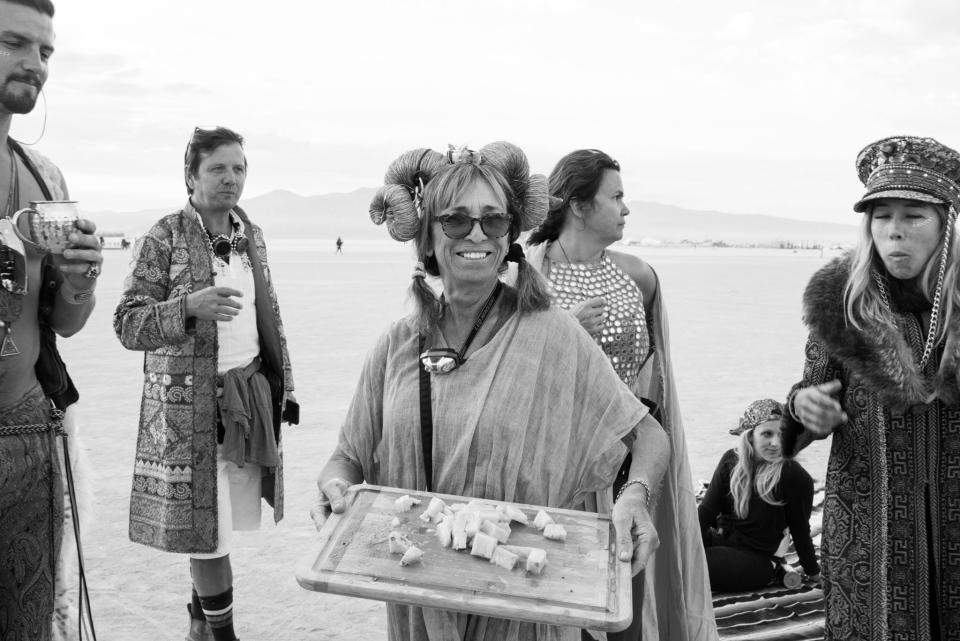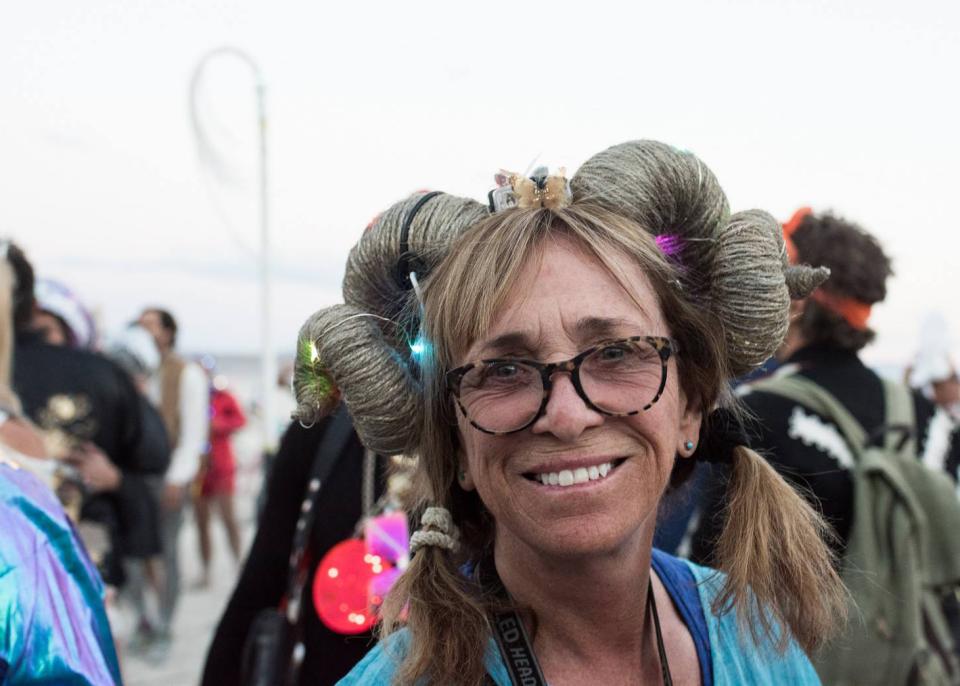A Sociologist Goes to Burning Man

Being an economic sociologist has always given me a unique way to look at the world. Just as a biologist sees the mold on food in his refrigerator as a natural substance with a Latin name—not my first reaction!—I often note the way in which society and economy shape each other in my own life.
When I wrote a book about the industry of direct selling, I was fascinated by how the firms Amway and Mary Kay Cosmetics were able to transform selling into moral activities like helping others, as more than a simple exchange of money for soap and lipstick.
My experience in this temporary society was that it was anything but a free-for-all.
My studies of the commercial building industry made me realize the ways in which social relations between subcontractors shaped their transactions, not just the quality or the price of the materials. This was why devices with superior energy efficiency were not being adopted, even when they were less expensive, which became the subject of my research.

When I went this summer to the giant art and music festival known as Burning Man, I was plunged into a temporary economy and society I had long hoped to experience as a sociologist.
Like Brigadoon, the mythic Scottish village that appears just one day every hundred years, Black Rock City (BRC) is the metropolis that hosts Burning Man every August for 10 days. Black Rock City forms from literally nothing in an arid Nevada playa to a city of nearly 70,000 people, only to disappear days later for another year.
A Society Beyond the Default World
This is not just a bunch of tents. There are two radio stations, security forces, three medical clinics, a DMV (Department of Mutant Vehicles) that issues permits to art cars if they are safe, information kiosks, bike repair stations and many other institutions similar to those in what is known as the “default world” outside of the festival, though they are completely remade to suit the Burning Man social order.
It’s a fabulous festival of artistic creativity that is justifiably celebrated for the magnificence of its many sculptures, interactive immersions, amazing music and fantastic art cars that look as though they’re from a magical realm. Burning Man also has a reputation as an anything-goes-society because social norms (including nudity) are quite different in BRC from the default world’s.
What most interested me as a sociologist was the idea that Burning Man is a gift economy.
My experience in this temporary society was that it was anything but a free-for-all. In fact, Burning Man the event and Black Rock City the metropolis have clearly-written expectations and strongly-enforced social norms. Burning Man has traditions and practices that enforce the idea that one is entering a different country, not anarchy, when arriving. People must share their credentials at the border of BRC, get a wrist band allowing entry, go through a census process collecting demographic data and then set up at a predetermined site that has an actual address.
Due to its distant location, inhospitable desert heat and dust storms, people often plan for months ahead of time for the festival. You have to bring your own shelter, food and water, and gifts to share. Arriving at BRC is like participating in a pilgrimage with long lines of overloaded trucks and cars wending into the desert on a two-lane road.
Building a Money-less Economy
What most interested me as a sociologist was the idea that Burning Man is a gift economy. There are only two things sold for money in Black Rock City: ice and coffee. But there is still a movement of goods and services despite the moneyless economy. The goods are not bartered; that is, people don’t trade sunscreen for food. There is no trading at all—only “gifting.”

A gift could be a trinket or something of use, but I experienced it most importantly as a gift of participation and generosity. For example, there are no spectators at Burning Man. Everyone is expected to be part of everyone else’s experience and no one should only be an observer.
There are two primary ways this happens. First, everyone wears costumes most of the time to contribute to the visual experience of everyone else. The costumes are often amazing and carefully constructed. And being playful is expected at Burning Man.
The other important type of gift is the creation of an artistic composition of some sort or a venue with services. The highest status people are the artists who produce extraordinary sculptures, temples or vehicles that transport others, often with music.
A third type of gift is a Theme Camp, a place where a group creates a venue that contributes perhaps a lecture, food, dance lessons or choral lessons. I went to a camp that had 36 shaded hammocks and another that helped people make tutus—everyone wears them on Tutu Tuesday.
Gifts here are not given with the expectation of a return at some future point. The expectation is that one joins joyfully into a gifting culture. Gifting is the price of membership, as is being a grateful recipient.
Gratitude: An Economic and Social Commodity
I had joined as part of the Pineapple Motel, a theme camp that served fresh pineapples, drinks and music in an enormous and stunning shelter. We also created the largest tower on the playa, which drew many in for viewing the sunset.
It was great fun to plan and execute our vision for the camp with my fellow “Pineapples,” a group of 45 from Toronto, London, Istanbul, Paris, Berlin, Melbourne, Brooklyn and, of course, many parts of California. They truly enjoyed planning the design, budget and logistics for this complicated gift.
I met so many people who gave me small gifts like a spritz of water or a bit of shade while standing in line for ice. In the process of thanking them—typically accompanied by a hug—I was able to learn who they were and what brought them to the Black Rock Desert. They learned my story as well.
The real gift to me, I realized, was being able to simply participate in the gifting culture that is Burning Man.
Nicole Biggart is a research professor and former dean of the UC Davis Graduate School of Management. Her work is showcased on The Systems of Exchange, an online resource for social theory of the economy.
Top photo: "Burner culture, rainbow costumes" by Tristan Savatier